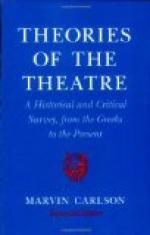Thus, whereas the Greeks religiously ascribed the source of all inevitable doom to divine foreordination, and the Elizabethans poetically ascribed it to the weaknesses the human soul is heir to, the moderns prefer to ascribe it scientifically to the dissidence between the individual and his social environment. With the Greeks the catastrophe of man was decreed by Fate; with the Elizabethans it was decreed by his own soul; with us it is decreed by Mrs. Grundy. Heaven and Hell were once enthroned high above Olympus; then, as with Marlowe’s Mephistophilis, they were seated deep in every individual soul; now at last they have been located in the prim parlor of the conventional dame next door. Obviously the modern type of tragedy is inherently less religious than the Greek, since science has as yet induced no dwelling-place for God. It is also inherently less poetic than the Elizabethan, since sociological discussion demands the mood of prose.
II
Such being in general the theme and the aspect of the modern social drama, we may next consider briefly how it came into being. Like a great deal else in contemporary art, it could not possibly have been engendered before that tumultuous upheaval of human thought which produced in history the French Revolution and in literature the resurgence of romance. During the eighteenth century, both in England and in France, society was considered paramount and the individual subservient. Each man was believed to exist for the sake of the social mechanism of which he formed a part: the chain was the thing,—not its weakest, nor even its strongest, link. But the French Revolution and the cognate romantic revival in the arts unsettled this conservative belief, and made men wonder whether society, after all, did not exist solely for the sake of the individual. Early eighteenth century literature is a polite and polished exaltation of society, and preaches that the majority is always right; early nineteenth century literature is a clamorous paean of individualism, and preaches that the majority is always wrong. Considering the modern social drama as a phase of history, we see at once that it is based upon the struggle between these two beliefs. It exhibits always a conflict between the individual revolutionist and the communal conservatives, and expresses the growing tendency of these opposing forces to adjust themselves to equilibrium.
Thus considered, the modern social drama is seen to be inherently and necessarily the product and the expression of the nineteenth century. Through no other type of drama could the present age reveal itself so fully; for the relation between the one and the many, in politics, in religion, in the daily round of life itself, has been, and still remains, the most important topic of our times. The paramount human problem of the last hundred years has been the great, as yet unanswered, question whether the strongest




